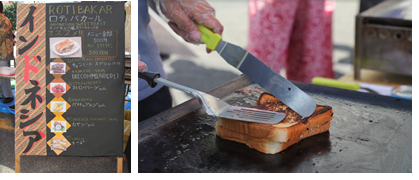Student organizations play a big part in a university student’s life. Through those organizational experiences, students can build connections, soft skills and gain various lessons that are not taught in lectures. For me, that was all possible because of the Indonesian Students Association in Tokyo Tech. In this article, I would like to share with everyone some of my experiences inside the organization.
Before that, however, allow me to explain the organizational structure for the Indonesian Students Association. In Japan, the association mainly consists of three separate levels: the national association, the regional associations (i.e., Kanto Region, Kansai Region), and the local university associations. The Indonesian association in Tokyo Tech is categorized as a local association. We call ourselves PPI Tokodai; PPI (/pɛpi i/) stands for Persatuan Pelajar Indonesia which means an association of Indonesian students, and Tokodai (/toco daɪ/) is an abbreviation of Tokyo Tech in Japanese.
The history of the Indonesian Students Association in Japan goes back to 1953 where it was established in Tokyo. As more and more students came to study in Japan, smaller (local) associations in various universities were established as well. Word is that PPI Tokodai has been around since the late 90s. Currently, there are over 100 Indonesian students studying in Tokyo Tech, where most of us are pursuing a Master’s or Doctoral Degree.
During my time as the Head of External Affairs, one of my responsibilities was to provide tours and guidance for any visiting groups or communities. We would show them around campus, give presentations about the study programs at Tokyo Tech, and if we get special permission, we would show them some of the research labs. Below are pictures of one of the events we organized.

We also have our angklung group. Angklung is an Indonesian musical instrument consisting of several bamboo tubes suspended in a bamboo frame, bound with rattan cords. To play it, an angklung player holds the instrument in one hand and shakes it with the other. We would have regular practice every other week and perform at special events. For example, we once played at an arts festival organized by the Tokyo Tech Alumni Association. We performed two song arrangements: Nat King Cole’s “L.O.V.E” and AKB48’s “Heavy Rotation”.

We also participate in Koudaisai, a school festival held once a year at the beginning of October on the Ookayama Campus. During the festival, there are a lot of food stands on the Campus and performances are done at classrooms or some places on campus. We use this chance to promote Indonesian culinary not only to Japanese people but to international communities as well. In addition, it is a good way to bring people in the association together and get to know the new students who enter in September. We like to change the menu every year. In 2017, for example, we sold Soto Ayam which is a type of Indonesian chicken soup. The following year, however, we sold Roti Bakar which is an Indonesian version of toast.

Despite being in Japan and far away from my family, PPI Tokodai helped me feel at home and comfortable in a new country. The fun extracurricular activities, such as the angklung group, served as a good distraction from my tough studies, while at the same time, the organizational experiences helped me learn and develop networks and the necessary soft skills I need in my future. I consider myself lucky because the Indonesian association in Tokyo Tech is well-established and relatively large in number. If you are also from Indonesia, I hope that this experience of mine can help with your consideration for studying at Tokyo Tech.
